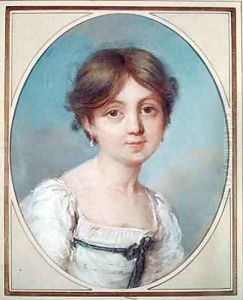Aurore (nee Saxe) Dupin de Francueil Paintings
Aurore Dupin, better known by her pseudonym George Sand, was a pioneering French novelist, memoirist, and socialist thinker of the 19th century. Born Amandine Aurore Lucile Dupin in Paris on July 1, 1804, she was of aristocratic lineage through her father, Maurice Dupin, a descendant of the Marshal General of France, Maurice, comte de Saxe, and through her mother, Sophie-Victoire Delaborde, who was more modestly of working-class background. Sand's early life was marked by the tension between her aristocratic privileges and her sympathy towards the underprivileged, a dichotomy that deeply influenced her later writings and political commitments.
George Sand's literary career began in earnest in the 1830s, amidst the Romantic movement, and her work was notable for its emphasis on the lives and struggles of women and the working class. She adopted the male pseudonym primarily to ensure her works were taken seriously in a male-dominated literary world and to avoid the societal scandal associated with her unconventional lifestyle, including wearing male attire and smoking publicly, which was almost unheard of for women of her time. Sand's personal life was as unconventional as her literary one; she had high-profile affairs with several leading figures of her time, including the poet Alfred de Musset and the composer Frédéric Chopin.
Sand's oeuvre is vast and varied, including novels, plays, political texts, and autobiographical works. Her most famous novels, such as "La Mare au Diable" (The Devil's Pool), "La Petite Fadette", and "Consuelo", explore themes of love, independence, and the search for identity, often set against the backdrop of the rural French countryside, which she loved. Sand was also deeply involved in the political and social upheavals of her time, advocating for women's rights and social reform. Her home at Nohant became a gathering place for leading artists and intellectuals of the day.
George Sand died on June 8, 1876, at her family estate in Nohant, France. She left behind a legacy as one of the most prolific and influential writers of her century, whose works and life continue to inspire debates about gender, identity, and social justice. Despite the controversies that surrounded her during her life, she is remembered today as a trailblazer for women in literature and a key figure in the Romantic literary movement.
